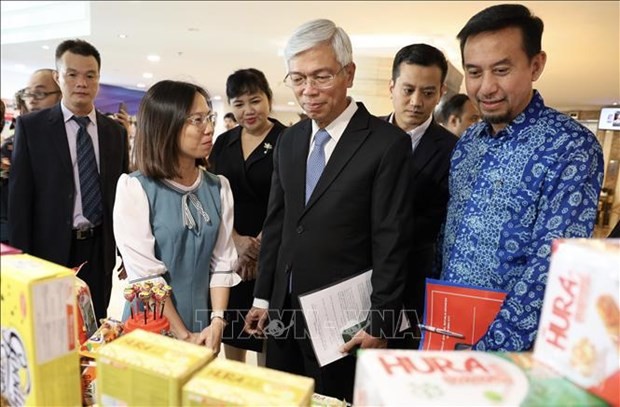
HCM City Forum seeks to develop Halal industry in ASEAN
Latest
 |
| At a stall of Halal products on the sidelines of the forum (Photo: VNA) |
Speaking at the event, Vice Chairman of the municipal People’s Committee Vo Van Hoan said the Islamic world now has over 2 billion people living in 112 countries, 57 of them are members of the Organisation of Islamic Cooperation (OIC).
The development of the Halal industry will draw Islamic investors and tourists to Vietnam, contributing to national development and enhancing cooperation with 57 OIC members, he said.
Indonesian Consul General in Ho Chi Minh City Agustaviano Sofjan said according to the State of the Global Islamic Economy Report (SGIE) 2022, the expenditure on Halal products and services is forecast to reach 2.8 trillion USD by 2025, compared to 2 trillion USD in 2021.
He said in addition to food, various other aspects of Halal living, including modest fashion, pharmaceuticals, cosmetics, tourism, media and entertainment, also hold significant potential. The Islamic finance sector reached 3.6 trillion USD in 2021, and there is still a demand for further expansion.
Cao Thi Phi Van, Vice Director of the HCM City Investment and Trade Promotion Centre (ITPC), cited statistics from the General Department of Vietnam Customs as saying that Vietnam’s total turnover of export-import to countries with large numbers of Islams in ASEAN reached over 26.37 billion USD in the first nine months of this year, including 143 million USD to Brunei, 10.18 billion USD to Indonesia, 9.31 billion USD to Malaysia and 6.7 billion USD to Singapore, which was modest compared to the potential of the region.
So far, Vietnam has only exported about 20 kinds of products to the Halal market while 40% of Vietnamese localities have yet to have Halal certified products for export.
Ly Kim Chi, Chairwoman of the Ho Chi Minh City Food and Foodstuff Association, said Vietnam is among the top 20 food exporters globally but has not yet made it into the list of the top 20-30 suppliers of Halal food.
According to her, the Halal certification process currently does not have permanent validity and is not universally recognised in all countries or for all products. This poses significant challenges for businesses as they have to undergo recertification multiple times and tailor their certifications to each export market's specific requirements.
Therefore, strengthening regional cooperation between HCM City and adjacent localities, as well as between Vietnamese firms and those from countries with a developed Halal industry, is of utmost importance, she said, adding that this not only raises awareness among businesses about Halal standards but also improves their export opportunities, while facilitating the establishment of a complete supply chain from raw material supply, production, distribution, and export according to Halal standards.

























